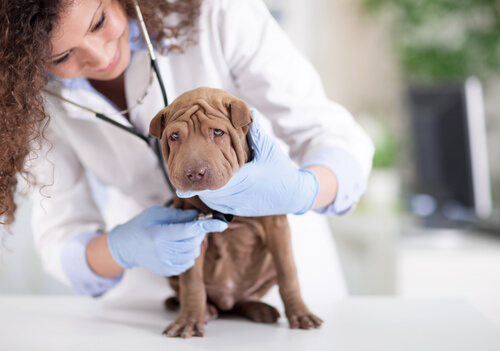How to Detect if Something is Wrong with Your Dog

Although you think you know your furry friend, and you know his body language like the back of your hand, sometimes it’s not so easy to detect his physical and emotional illnesses. That’s when you wonder how you can know for sure that something’s wrong with your dog. We’ll tell you a few things you should take into account.
Dogs and pain

For example, our four-legged friends do not openly manifest pain like we do. The reasons are diverse:
- They can’t speak our language to tell us more or less what is happening to them.
- And, they have higher pain tolerance than humans.
- Also, they try not to manifest pain as a survival technique, something they learned from their ancestors.
We’ll tell you the signs that you should pay attention to in order to determine if your furry friend has a physical or emotional health problem.
Signs that indicate that something is wrong with your dog
Generally, if something is wrong with your dog, you’ll note a change in behavior, or he might stop doing something he normally does.
Pay attention to the following signs:
- Excess vocalizations. Sighs, howls, growls, and barks. If your dog is more verbally expressive, be on the alert.
- Constantly cleaning a certain part of his body. Although there may be no visible wound, your dog probably wants to alleviate an internal pain by licking the place persistently.
- The animal sleeps more. A dog who doesn’t feel well will probably spend more hours resting. He might do so in order to cure himself. Or, it may be painful to move.
More signs that your dog doesn’t feel well
Although they may seem obvious, you can’t be too careful– remember these signs that definitely indicate that your dog has a health problem:
- He doesn’t eat.
- Maybe, he drinks water excessively, or stops drinking it.
- Or, he breathes in a an altered way, even though he hasn’t done excessive physical activity.
- Perhaps, he has difficulties lying down, sitting, getting up, or moving.
- Is restless.
- Adopts unusual postures.
- Hides or isolates himself.
- Is more cuddly than usual.
- Manifests irritation or has aggressive attitudes.
- There are changes in the amount or appearance of urine and feces.
- Vomits continuously.
- Limps.
Less obvious signs that your pet has a physical or emotional problem
Some illnesses don’t manifest themselves clearly until they reach advanced stages. Or, their signs are not very obvious.
Keep in mind that:
- When a dog squints frequently and his pupils become smaller, he is likely to be suffering from eye pain.
- Dilated pupils are often a sign of pain elsewhere in the body.
- Lumps may be present, that have different origins and can be benign or malignant. Many times they are not entirely visible. And, they have no reason to be painful. That’s why it’s good to do a thorough search to find them.
- Otitis is difficult to detect. See if your dog tilts his head frequently.
- Whitish gums usually indicate anemia.
- Also, if the pet emanates a strange or unpleasant odor from any part of his body, it is very likely that something is not working completely well.
Don’t stop bringing your pet to the veterinarian

If your suspicions that something is wrong with your dog are becoming more and more founded, try to detect where your dog hurts. Feel his whole body carefully, as the pain may provoke an aggressive reaction.
Keep in mind that changes in your dog’s conduct and habits may not be because of something physical. Don’t discard the possibility that he may be undergoing stress or feel fear for some specific reason.
In any case, what you must do is contact a veterinarian without wasting time. This way your pet can diagnosed quickly and can be given adequate treatment.